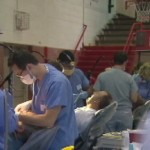The other day, in a moment of of inattention, I left two pills I was going to take out on the kitchen counter.  Extremely bad form, I know.  But, something distracted me at the critical moment – and it happened.
Sometime later, Indra, one of our seven rescue cats, jumped up on my desk as he often does. But this time he was foaming and drooling at the mouth in great gobs.
I jumped up, ran to the kitchen to grab a paper towel and then I saw the remaining one pill there on the counter top. Click! – it all came together and I knew why he was like that.
Damn! Damn! Damn!
I grabbed Indra up and took him to the nearest bathroom so I could keep him corralled and yelled for my wife to come and help.  She went into the bathroom and as she did, she reminded me that we have an Animal Poison Hotline magnetic sticker thingy on the refrigerator.  It’s something that’s been there for several years.
I ran to the kitchen and grabbed the phone and, yes, there was the little magnet that said “Animal Poison Hotline” right there where she said it was.  I called them in a semi-panic.
A nice voice answered and said who they were and then asked me to press “1”, if this was about an animal poisoning event.  Then it asked me if this was a new event (press “1”) or a previous event (press “2”).
Once I’d pressed “1” and then “1” again, the voice said that since they received no state or federal money for delivering their services, that there would be a $60 consultation fee and that I should have my VISA or Master Card ready.  I looked at the phone with sheer incredulity.  I realized I had just gotten tangled up with the Animal Poison Hotline equivalent of ambulance chasers.
I hung up and dialed our local vet while my wife was shouting to “Hurry up” from the bathroom.  I hadn’t called them first because it was 5:30 PM and I thought they were closed.  But, thank God, when the phone rang, someone answered and a vet was on the line in a few seconds saying to bring Indra in right away. Turns out they were open until 6:30 PM.
To make a long story short, Indra turned out to be OK.  We later found the missing pill and he’d chewed it some but only made one small puncture in it before the vile taste must have made him spit it out.  But, at the time, we didn’t know that and thought he’d swallowed 200mg of Celebrex.  So, what could have been several days of efforts to save him (and maybe lose him) and several thousands of dollars ended up being a two local trips to the vet and about $300.
But, I am still deeply rankled at the “Animal Poison Hotline” people and their credit card demands. In fairness, when I looked closely at the magnetic sticker later, it did say, in small print, that there would be a ‘per incident’ fee.
But I’m imagining the motivations of the folks who printed the magnetic stickers up and distributed them.  They were seeking a profit and one great way to do that is to match a service with a need.  And this one’s a beauty.
When someone calls up and their beloved pet has potentially been poisoned, they are not going to quibble over $60 and a credit card number when minutes may mean life or death.  But, what a nasty time to jack them up.
Thinking about all of this, I remembered that years ago I had been deeply pissed off when I read an expose in the Orange County Register about how the local fund raising drives for the local police and firemen actually worked.
The police and firemen didn’t actually have the time or the expertise to man the phones, so they’d hire an outside company to do their fund raising.  These folks would call you up and say, “This is the Orange County Fireman’s Association – how are you this evening?“  And then they’d start in on you for donations for various things to help the firemen.
It was a sweet deal for everyone except the donor.  The fireman’s Association got some money out of the deal and they didn’t have to pay the fund raising folks a penny because their contract let them take 80% of the proceeds off the top for their services. And the firemen were happy because 20% of something is way more than 100% of nothing. And it was totally free for them.
But, the donor’s, who were giving out of the goodness of their hearts, didn’t know that 80% of their gifts were going into the pockets of the fund raisers and their lavish life styles.
I’m wondering if something similar isn’t going on here.    Wouldn’t people scream if uncle Bob was down on the floor with a possible poisoning and they called a human poison hotline and got held up for a credit card fee before they could proceed?
Stinky stinky stuff.
Are you wondering who these folks are so you can steer clear of them?
They are:
North Shore Animal League
and
PROSCAR International Animal Poison Center
Believe me when I tell you that you’d be far better off to put the number of your local vet up on your fridge RIGHT NOW.  And then call your vet and ask them for the phone number and location of the local 24 hour emergency vet in case you have an after hours emergency.  And then put that number up there as well.
